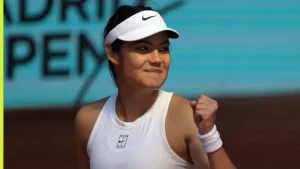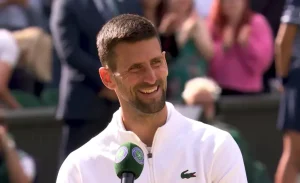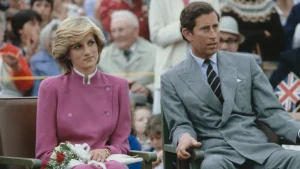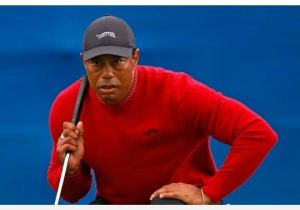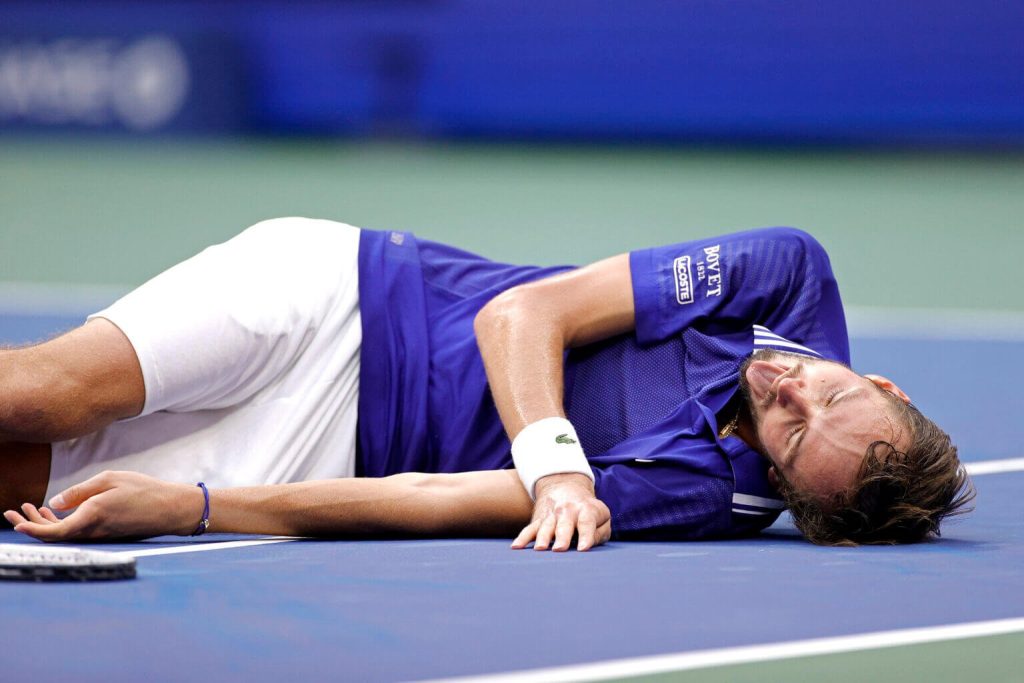
Daniil Medvedev isn’t playing tennis right now. He has been resting up at home in Monaco with his wife and baby daughter after the most absurd run to the precipice of a Grand Slam that any tennis player has ever had.
He surely needs the rest and that has presented an opportune moment for a mid-career retrospective. Sure, he lost his fifth Grand Slam final in six tries and, in the process, became the first player to lose two Grand Slam finals after leading by two sets, but Daniil Medvedev is having a moment.
Andy Roddick is throwing lusty praise his way, calling him a far better player than he ever was.
Darren Cahill, the coach of Jannik Sinner and multiple former world No 1s, called him a “warrior” with one of the top tennis IQs on the planet.
And with that, a collective cry of “finally” is rising, from tennis enthusiasts who appreciate a player who does not look like all the others; from the aesthetes who have long watched his matches with their mouths agape, wondering how anyone could get a ball over the net swinging like someone trying to smash a fly with a magazine in a small bathroom, or return serves while basically leaning against the back fence; from rivals he has long drubbed; and even from modern language majors long awed by his mastery of sarcasm and self-mockery in French and English along with his native Russian.
It has taken yet another heartbreaking finals loss, this time to Sinner, the newly arrived Italian star seemingly destined to rule the sport with Carlos Alcaraz for the next decade in a way Medvedev never has. Sinner delivered another moment when the younger generation made it clear it has no intention of waiting its turn and another tournament where Medvedev’s quest to not be seen as a one-Slam wonder (he really isn’t). But across three weeks in Australia last month, it became clear that peak Medvedev, who turned 28 on Sunday, is truly here.
For the uninitiated, in an era filled with players trying to clone the classic strokes of Roger Federer, Rafael Nadal and Novak Djokovic, Medvedev is the game’s iconoclast. He neither looks nor plays like anything that gives off classical vibes. He is a panoply of randomness — sublime athlete, hardcore video gamer, family man, and tennis nerd not averse to the game’s dark arts and psychological warfare.
Even Gilles Cervara, his coach of the last seven years (an eternity in tennis coaching), finds him to be something of an enigma. Cervara said recently that, sometimes, he will question Medvedev about his game or his mid-match thought process, expecting a sophisticated response from the world No 3, a Grand Slam winner who reached No 1 two years ago. Doesn’t happen.
“I have the feeling that I’m talking to a teenager,” Cervara said.
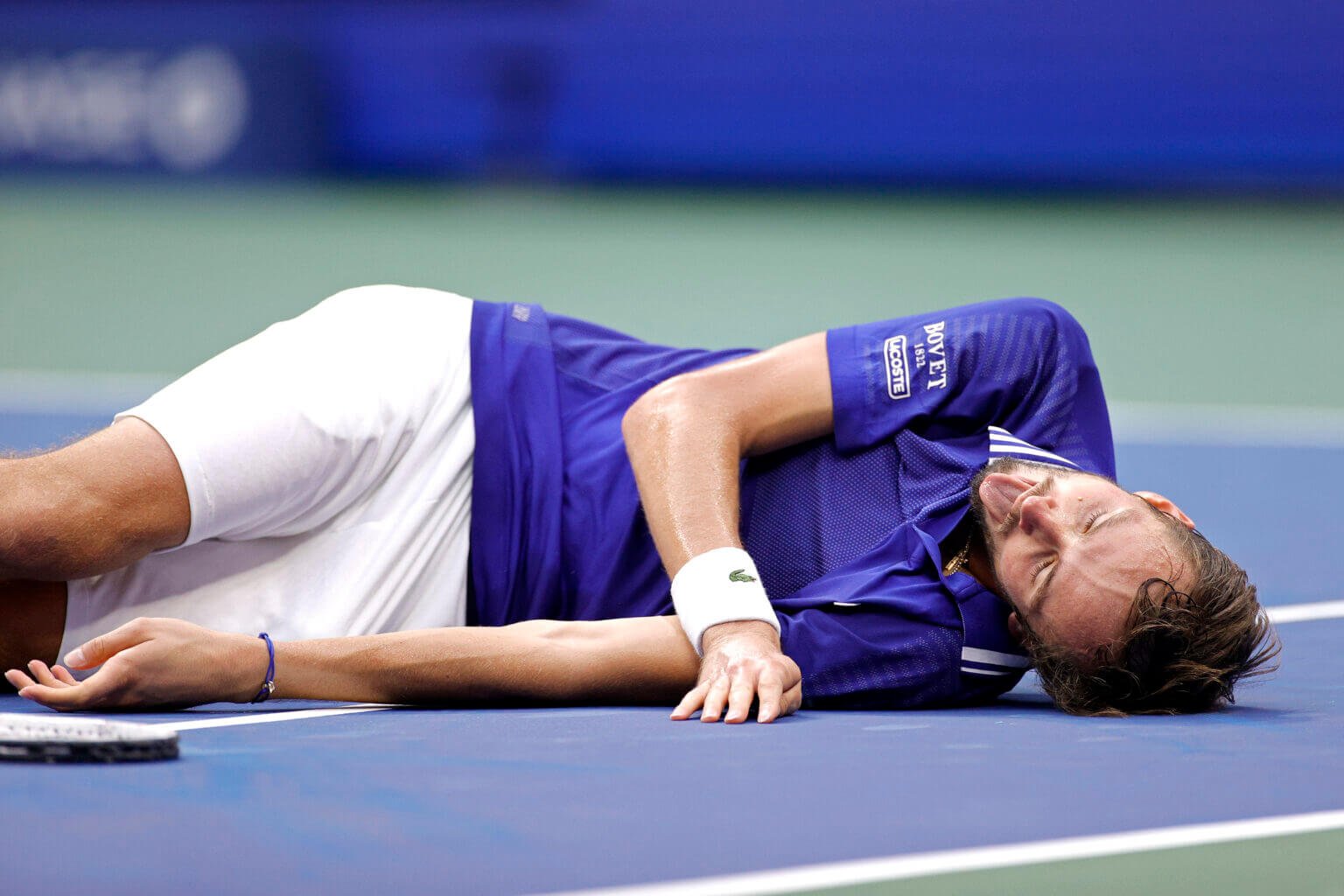
Medvedev may wear Lacoste, one of the game’s classic brands, but the clothes cover the wiry physique of the bass player in an indie rock band who too often goes to sleep after sunrise and subsists on too much diet Mountain Dew. His hair is generally a sweaty mess.
His jawline is perpetually half-covered with the scruffy beard of a Russian Revolution intellectual, which is fitting because he plays and watches tennis points like they are moves on a chess board. In a back room at the All England Club last July, as Medvedev watched the last games of the fourth-round match between Christopher Eubanks and Stefanos Tsitsipas, he correctly predicted the direction of every serve and called out the shot sequences of each point before they happened. No wonder he came back from a set down to beat Eubanks in five sets two days later.
“As Jannik said, we learn every time we step on to the court playing Daniil,” Cahill said after the Australian Open final.
Daniil Medvedev’s forehands and backhands are more swats than strokes. He is the rare player who, when he is starting his service motion, never allows the ball to touch any part of his racket, which is just plain weird — and hard. He’s won 20 titles, but never won the same tournament twice.
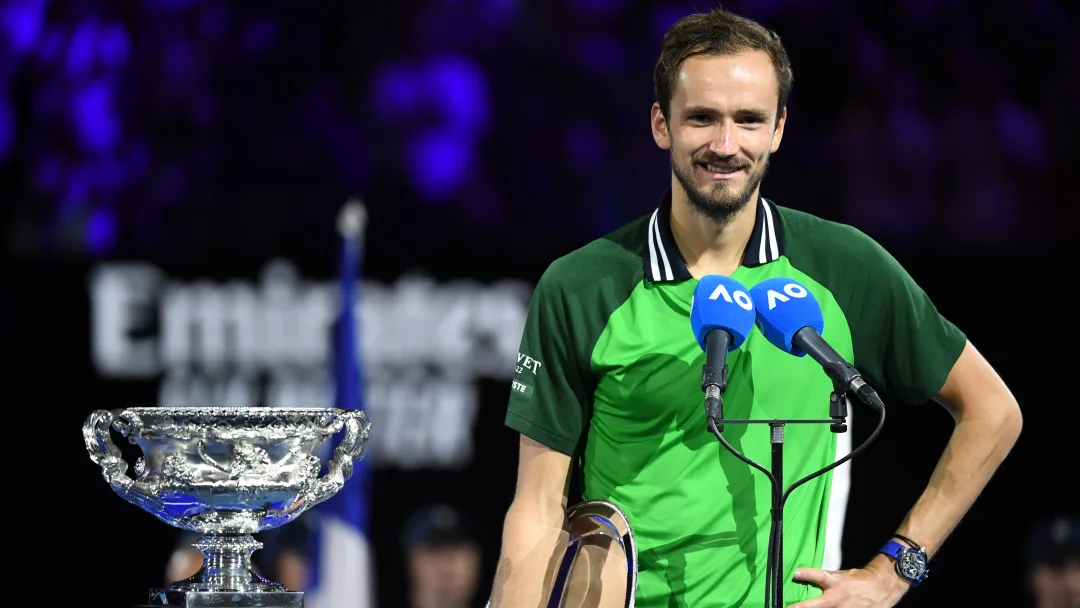
Even his player’s box, which most top players overstuff with coaches, handlers and hangers-on, is different, especially at the big events, when it is mostly empty.
Cervara is there along with his trainer or physiotherapist. His agent, Olivier van Lindonk, might be sitting a row behind them. Very occasionally, Medvedev’s wife, Daria (‘Dasha’), is there, often wearing glasses and dressed like she’s coming from the gym or a bookstore rather than treating the player’s box as a fashion runway like most tennis player partners do. And that’s about it.
New Year. New Daniil.
Medvedev began this year with some declarations and resolutions.
He wanted to change. He wanted to mature.
No more egging on the crowd if they are booing him (U.S. Open 2019 and various other occasions).
Dial back on the goofy mid-match rants: “I’m going to pee as slow as this court!” (Indian Wells, March 2023).
No more on-court stunts, like knocking out the stick that props up the net to shake things up when they aren’t going his way (Monte Carlo, 2023).
“I just want to kind of go with who I am, try to do less of the stupid things that don’t help me as a person and tennis player,” he said in Melbourne in mid-January.
Say it ain’t so. ‘Meddy’ loyalists everywhere wanted to shake him and make him repeat a catchphrase of the day — authentic self, authentic self, authentic self.
In his teens, Medvedev, who declined to be interviewed for this story, was the worst of a vaunted crew of young Russians trying to break into the ATP Tour. The group included Karen Khachanov and Andrey Rublev, who is one of his closest friends and his daughter’s godfather. After growing up in Russia, he moved to France as a teenager to pursue professional tennis, one of several reasons he has stayed far away from any discussions of Russian politics or the invasion of Ukraine — he has not lived there in more than a decade.
At 21, when he still was outside the top 50, a fellow resident of the French Riviera named Novak Djokovic asked him if he wanted to practice. He couldn’t believe it, but then there he was on the court a few mornings later warming up with the previous and soon-to-be-again world No 1, who treated him as a peer and even invited him to fly with him on his plane to the upcoming Davis Cup tie between Serbia and Russia while they were kibitzing before practice.
Medvedev told Djokovic he already had a plane ticket. Then he spent the next hour while they were playing thinking he had made a stupid mistake. When the practice ended, he figured, what the hell, and asked Djokovic if the seat on his plane was still available. It was. Medvedev has never forgotten the gesture.
Four years later, Medvedev beat Djokovic in the 2021 U.S. Open final, preventing him from winning all four Grand Slams in a single calendar year. The following August, he stood on a balcony of the New York Palace Hotel in the late afternoon, looking pensively at the traffic passing a dozen stories below him.
“Since I started coming as a junior, I just always really loved to be here,” he said that day.
A year ago, Medvedev fell out of the top 10 for the first time in since 2019, but he has played some of the best tennis of his career since then, following the few months of adjustment after his wife gave birth to their daughter, Alisa, in October 2022. Don’t suggest a simple narrative like fatherhood making him a better tennis player because he has matured and found new perspective.
“Two different stories,” he said recently with typical deadpan honesty. “You can be a good tennis player, bad parent; bad tennis player, good parent.”
By his early 20s, Medvedev had emerged as a threat to go deep in any big tournament, making the finals of the U.S. Open in 2019, but had also evolved into a kind of tennis villain, claiming never to be happier than when packed stadiums howl at his disruptive antics, which wasn’t really true. By 2022, he was pretty sick of it.
When the latest season of Break Point, the Netflix series about the pro tennis tour, recently seized on that narrative and used him as a foil for Zverev, he was not pleased. Zverev has twice been accused of physically abusing girlfriends, which ‘Break Point’ neglected to mention.
The “series is not real life,” Medvedev said.
An Australian Open to remember
In Australia last month, Medvedev put on the most Medvedevian of displays. To understand what that means, it’s important to understand why, even though he was wearing a Chicago Bulls hat in Australia, Cervara is almost always wearing a hockey hat.
Cervara loves hockey, but what he really loves are great hockey goaltenders. Henrik Lundqvist, the retired New York Rangers star, is his favorite, hence the oft-worn Rangers cap.
Cervara’s goalie obsession helps explain how Medvedev came to play tennis like a human backboard, a man willing to swat those crazy strokes and run down balls all day and all night, exhausting players into submission.
“He’s literally someone that really doesn’t give you anything,” Zverev said of Medvedev, who has tormented him for much of his career. “He makes you work for every single point and once you kind of can’t really do that anymore, it becomes very difficult.”
One of the highlights of Australia was the post-match interview that the former world No 1 Jim Courier conducted with Medvedev that was more of a walkabout, with Medvedev, one of the great tennis pundits, showing and telling the advantages of standing more than 15 feet behind the baseline to return serve, but admitted that tactic made him vulnerable against players with great drop shots.
Courier asked him what would happen if opponents didn’t have a great drop-shot.
“Well, then I am going to win the tournament,” he said.
Almost.
Medvedev played four five-set matches in Australia. He spent 24 hours and 17 minutes on the court, the most in modern Grand Slam history. His second-round match lasted until 3.40am. He finally went to bed at seven that morning.
He was so exhausted by the end of the tournament he had to abandon his usual tactics and go on the offensive against Sinner, knowing he could not trade backhands for five hours. It worked until it didn’t.
“Daniil went to hell and back in this tournament, what he put himself through physically,” Cahill said of Medvedev after the final. “I can’t even imagine how he’s feeling.”
